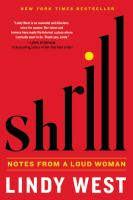Shrill: Notes from a Loud Woman by Lindy West
The word “shrill,” evocative and onomatopoetic, conjures high-pitched, grating voices. It’s used derogatorily, and it’s often aimed at women.
Author Lindy West re-appropriates it in her book Shrill: Notes from a Loud Woman, a memoir that’s as funny as it is poignant. West is a former movie reviewer for Seattle’s The Stranger whose social commentary regularly appears in The Guardian, the New York Times, This American Life, Cosmopolitan, and Jezebel, among others.
She lets loose in longer form, with raucous, delightfully profane chapters recounting her childhood and adolescence and showing how she grew more adept at raising her voice to speak up on issues that mattered to her.
A core part of West’s identity is her weight. She writes heart-breakingly about a time when even the seatbelt extender on the airplane was not sufficient, and her panic and pain at having to squeeze into a seat. She eventually learns to embrace the term “fat,” and to find strength in her size.
She writes, “The breadth of my shoulders makes me safe. I am unassailable. I intimidate. I am a polar icebreaker. I walk and climb and lift things, I can open your jar, I can absorb blows—literal and metaphorical—meant for other women.”
West took some big hits when she penned an article for Jezebel entitled “How to Make a Rape Joke.” West attempted to find a middle ground between strident feminists who do not think rape is a laughing matter, period, and obtuse First Amendment supporters who claim their rights are violated (get it?) if they aren’t “allowed” to share their nasty, vitriolic humor.
According to West, jokes that poke fun at the rapist, not the victim, are fair game, as are ones that point out how frightening it can be to be a woman, or how oblivious some men can be about this. She listed several examples, cushioned it all with plenty of disclaimers and generally came across as reasonable.
Yet a corner of the internet exploded, and crude threats and insults rained down on West by the hundreds. They attacked her weight, her intellect and her gender, even saying she was “too disgusting to get raped.” One vile troll went so far as to create a fake Twitter account posing as West’s dead father. This level of harassment went way over the line, and how West addressed it (and ultimately received an apology from her attacker) makes for powerful reading.
Equally fascinating are West’s dialogues with comics and other powerful men she once admired (yes you, Dan Savage) and her honest and loving explorations of her relationships with her father and her husband.
Christine Perkins is the executive director of the Whatcom County Library System. She serves on the programming committee for Bellingham City Club.
(Originally published in Cascadia Weekly, Wednesday, April 11, 2018.)

